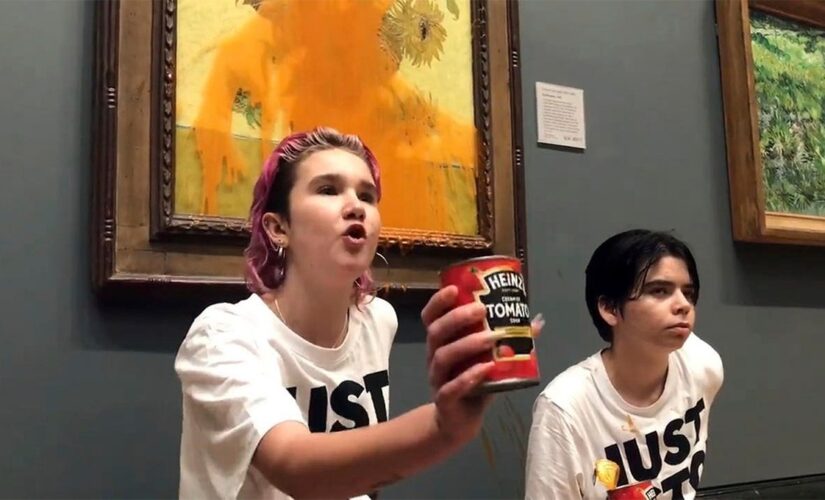Radical climate change protesters worldwide are increasingly using priceless works of art and art galleries as political fodder in their activism.
On Sunday, two activists from the group Letzte Generation (Last Generation) threw mashed potatoes at a $110 million Monet painting in a Potsdam museum.
That came just nine days after cans of tomato soup were emptied over a van Gogh painting by members of “Just Stop Oil,” the same group whose members glued themselves to the frame of da Vinci’s “The Last Supper” at London’s Royal Academy of Arts and John Constable’s “The Hay Wain” in the National Gallery in July.
Protesters glue their hands to the frame of John Constable’s The Hay Wain after first having covered the painting with their own picture, inside the National Gallery, London, Monday July 4, 2022.
(Kirsty O’Connor/PA via AP)
A security guard looks at protesters who glued their hands to the frame of John Constable’s The Hay Wain, inside the National Gallery, London, Monday July 4, 2022.
(Kirsty O’Connor/PA via AP)
That same month, members of the Italian group, Ultima Generazione (also Last Generation), glued themselves to Sandro Botticelli’s Primavera in Florence’s Uffizi gallery.
And earlier this year, a man threw cake at a painting at the Louvre Museum.
And on Monday, Just Stop Oil activists smashed cake into the face of a King Charles III waxwork at the Madam Tassauds museum in London.
In each of these instances, the works themselves were not destroyed, having been encased in protective glass. But the demonstrations call attention to an alarming new trend. And it raises concerns that priceless works of art could actually be destroyed as more radical protesters try to up the ante in their activism.
STOLEN ‘WOMAN-OCHRE’ PAINTING, WORTH $100 MILLION, RETURNED TO ARIZONA MUSEUM
Sally Hickson, an art historian at the University of Guelph in Canada, told Fox News Digital that each act must be contextualized, but worries that the next stage of this trend could be something “irreparable.”
“[T]here are so many copycats. We see so much and a lot of things that people are doing are totally about imitation. If you look at your average TikTok videos, people are responding to particular things,” Hickson said. “We live in that kind of culture now where everything is just really fast in terms of reproducing itself.”
While sympathizing with the activists’ concerns about climate change, she questioned whether their actions would necessarily convince more people.
After throwing mashed potatoes onto the painting, the climate change activists glued their hand to the wall.
(Letzte Generation)
“Does it convince people? It’s very hard to convince people when people are blind to what is happening around the planet. I don’t know that it would convince any of those people,” she said. “I mean, I just think we live right now in a period of time when people have very entrenched ideas about things.
Matthew Jesse Jackson, an art history professor at the University of Chicago, said art does not occupy as prominent a space in people’s lives as does movies, TV or TikTok but doubted whether the protesters’ actions would make more people concerned with climate change – as was their goal.
“If it’s a painting in a museum … most people would say, that’s a work of art that should not be vandalized,” Jackson said. “I think engaging with artworks (in a non-standard) way is highly unlikely to bring a great deal of attention to a problem.”
Fidia Falaschetti, an Italian-born artist and sculptor based out of Los Angeles, said he sympathized with political activism generally, but felt “a little bit lost” with these attention-seeking tactics.
Such tactics – like throwing tomato soup on Van Gogh’s “Sunflowers” – “just make divisions,” Falaschetti said. “Which is pretty much what society is made of right now.”
“It’s going to divide people more than unite people,” Falaschetti said. “How much of the shock and ‘wow’ effect do you want? Because nowadays, society is very much into social media and doing the craziest thing that gets attention.”
Visitors observe the painting ‘La Joconde’ The Mona Lisa by Italian artist Leonardo da Vinci on display in a gallery at Louvre on May 19, 2021 in Paris.
(Marc Piasecki/Getty Images)
While being careful not to judge the young activists personally, Falaschetti questioned their choice of targeting a van Gogh, noting that the Dutch painter struggled all of his life with poverty.
“I do believe this was a little bit disrespectful because despite the fact that the painting had a glass [cover], I do believe that doing something like that towards a guy who felt a lot of pressure from his society,” Falaschetti said. “I do believe there are so many other ways to just talk about whatever is not going good in society.”
JUST STOP OIL ACTIVISTS SMASH CAKE ON KING CHARLES III WAXWORK AT MADAM TUSSAUDS
Falaschetti also doubted whether these protesters are necessarily endearing themselves to anyone, arguing that their actions may ultimately make people more hostile to climate change activists.
“I think that the majority of people will say, ‘look at those (protesters). What are they doing?’ They don’t even think about the matter,” he said.
Handout photo issued by Just Stop Oil of two protesters who have thrown tinned soup at Vincent van Gogh’s famous 1888 work Sunflowers at the National Gallery in London, Friday Oct. 14, 2022.
(Just Stop Oil via AP)
“You can find the right way to get to the heart of people and make them think and take action in their day-to-day life,” Falaschetti said. “But why do this violent nonsense … and risk being labeled as young and stupid? That’s not the right way.”
Falaschetti said art is something that reflects society, something that “leaves a trace of us,” something that has given a voice to the people.
CLICK HERE TO GET THE FOX NEWS APP
“Art has to be protected,” Falaschetti said, otherwise “we wouldn’t be leaving any traces for the future.”




